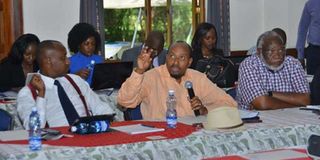Senators ask SRC to harmonise county govt employees' salaries

Mandera Senator Billow Kerrow (centre) speaks during a public sector remuneration and benefits policy stakeholders' workshop in Naivasha on May 18, 2015. Senators have criticised the National Assembly for denying them the proposed Sh1 billion meant to enable them monitor and evaluate devolution. PHOTO | SULEIMAN MBATIAH | NATION MEDIA GROUP
What you need to know:
- They noted that many workers were resigning or declining jobs in the counties due to the poor pay.
- Mr Kithinji Kiragu said SRC had realised the mistake of basing the wage bill on the GDP and had done away with the system.
- Ms Sarah Serem noted that salary discrepancies were the cause of perennial industrial unrests and promised that the policy would end the problem.
- She told the participants that hardship allowances had been improved and that negotiations were still underway for better perks.
Senators have called for the harmonisation of salaries for workers in the counties with those working for the National Government.
Speaking during the Public Sector Remuneration and Benefits Policy stakeholders’ workshop in Naivasha, they noted that many workers were resigning or declining jobs in the counties due to the poor pay.
They gave an example of doctors whom they said move to the private sector or seek employment in other countries with favourable terms after the health sector was devolved.
Budget and Finance Senate Committee chairman Billow Kerrow wondered why the proposed wage bill policy had ignored the counties yet that was the current focus of development.
“The proposed wage bill policy has nothing about the counties and I would want it to have clauses specifically tailored for the devolved governments because the challenges being faced by the National Government and the revenue collection are not the same as in the counties,”he said.
He wondered how the Salaries and Remuneration Commission (SRC) could justify lack of hardship allowances for people working in remote and insecure regions.
The seven senators present during the morning session at the meeting being held at Lake Naivasha Simba Lodge asked the salaries commission to focus on specialised areas and consider basic pay and compensation for performance.
WAGE BILL AND GDP
Migori Senator Wilfred Machage questioned SRC’s decision to base the wage bill on the gross domestic product as the denominator saying that the system was prone to mistakes and underrating.
“Under-quoting the GDP is a common occurrence among the developing countries and in such a case the wage bill will be given a lower percentage,” he said.
However, public sector policy consultant, Mr Kithinji Kiragu said SRC had realised the mistake of basing the wage bill on the GDP and had done away with the system.
“Last year, Kenya’s GDP was underestimated and that is why SRC is now pegging the wage bill on domestic revenue to ensure that there are no mistakes,” he said.
He said the current wage bill was at 50 per cent of the domestic revenue adding that SRC wanted to reduce it to 35 per cent thereby ensuring that there were sufficient resources for development.
He said SRC was going to form a multi-sectorial committee to look into disparities, inequity, fairness, productivity and other complex issues affecting the wage bill.
The commission’s chairperson Ms Sarah Serem noted that salary discrepancies were the cause of perennial industrial unrests and promised that the policy would end the problem.
She said it was unfortunate that the public sector was losing the best brains to the private sector while others sought greener pastures abroad.
She promised that with a proper framework, the commission would ensure that the government becomes an employer of choice.
She told the participants that hardship allowances had been improved and that negotiations were still underway for better perks.
“We are going to ensure harmony and equity, evaluate jobs and ensure that we get the true worth of all government employees,” said Ms Serem.





